|
Play List: 4. Corinne 7. The Mormons 9. Lucy Brandon 10. Storm-Beaten 11. Lady Clare 13. Bachelors 14. Constance 15. Lottie 16. Agnes 17. Alone in London 18. Sophia 19. Fascination 20. The Blue Bells of Scotland 21. Partners 24. Angelina! 25. The Old Home 26. A Man’s Shadow 27. Theodora 29. Clarissa 30. Miss Tomboy 32. Sweet Nancy 33. The English Rose 36. Marmion 37. The Gifted Lady 38. The Trumpet Call 39. Squire Kate 40. The White Rose 42. The Black Domino 44. The Charlatan 45. Dick Sheridan 47. Lady Gladys 48. The Strange Adventures of Miss Brown 49. The Romance of the Shopwalker 52. Two Little Maids from School ___ |
|
ROBERT WILLIAMS BUCHANAN (1841 - 1901) |
|
|
|
|
|
|
|
|
BUCHANAN’S THEATRICAL VENTURES IN AMERICA 1884-1885 - continued (i)
Harriett Jay
Meanwhile, Harriett Jay was pursuing her acting career and the play chosen for her American début was Tom Taylor’s Clancarty. She had previously played the part of Lady Clancarty in a provincial tour of the play in the autumn of 1881, following her appearance in Buchanan’s The Mormons: or St. Abe and his Seven Wives at London’s Olympic Theatre. Reviews of her British performance are available here.
The New York Times (26 October, 1884 - p.14) Miss Harriet Jay, who comes from London and not from the rural districts, will play at a special matinée to be given in the Madison-Square Theatre a week from next Wednesday. Upon that occasion “Clancarty” will be played. The piece is to be produced under the supervision of Mr. Robert Buchanan, whose firm and often-declared belief it is that Miss Jay is going to impress the American public as the most resplendent vision ever unfolded to its view. Miss Jay is in actuality regarded in Great Britain as a novelist of some industry and a lady of many charming personal traits. But of her stage abilities Mr. Buchanan is by all odds her most ardent herald. In “Clancarty” the lady has acted a good many times. Upon the forthcoming occasion at the Madison-Square she will be supported by Mr. and Mrs. Whiffin, Mr. Kelcey, and the other members of that company. “Clancarty” will be presented for “one consecutive time.” ___
The New York Times (2 November, 1884) The performance of “Clancarty” which is to be given on Wednesday afternoon at the Madison-Square Theatre for the purpose of introducing Miss Harriet Jay to the American populace will not include the services of Mr. Kelcey, as was originally announced. The gentleman has been obliged to throw up his part in order to more carefully devote himself to rehearsals at the Wallack Theatre. His place in the cast of “Clancarty” will be taken by Mr. Eben Plympton. The principal design of this stage representation seems to be to prove to the great American public that Miss Jay is a vastly more beautiful woman than Mrs. Langtry. ___
The New York Mirror (8 November, 1884 - p.6) PLYMPTON.—Eben Plympton resigned his part in Clancarty, which was to have been produced yesterday afternoon at the Madison Square, with Harriet Jay as the star,. He had a disagreement with the lady at rehearsal. ___
The New York Mirror (15 November, 1884 - p.3) —Charles Glenny will play Clancarty at the much-talked-of matinee to be given by Harriet Jay. He is the third actor to be offered the part. ___
The National Police Gazette (New York) (22 November, 1884 - p.3) Harriet Jay—Heaven avert the omen of her name—is Robert Buchanan’s sister-in-law. Robert Buchanan is a Scotch-Englishman who writes good novels and vile plays between meals. (He has a poor appetite, and is only good for ten solid feeds per diem.) A pretty tough play by the weak-stomached Robert, Lady Clancarty named, will introduce the Jay to the American public at a matinee shortly. . . . Robert Buchanan, having found a boarding-house in which he can get ten meals a day, has concluded to stay in this blarsted country and work it for all it may be worth. Although he can’t write a play any more than Joaquin Miller can, he has got the Madison Square theatre to accept “A Nine Days’ Queen,” in which Miss Harriet Jay will be introduced to the American public. Persons who have seen the lady play in London say that she is singularly well named. ___
The Daily Bee (Omaha) (25 November, 1884 - p.2) A NOVEL FEMININE COSTUME Picturesque Costume of a Hod-Carrier New York Letter to Buffalo Express. ___
Spirit of the Times (New York) (29 November, 1884) SPIRIT OF THE STAGE. NEW YORK. WEDNESDAY, NOV. 26. . . . TO-MORROW (Wednesday) afternoon, for charity’s sake, at the Madison Square theatre, Miss Harriet Jay, a story- writer from London, will play Lady Clancarthy. She has already impersonated the character, for charity’s sake, in several English cities and towns. For charity’s sake, Adeline Stanhope will be the Lady Betty; Mrs. Tom Whiffen the Mother Hunt; Charles Glenny the Earl Clancarthy; J. W. Piggott the King William; E. J. Henley the Lord Spencer, and Tom Whiffen, casting aside his smiles and amiability, will attempt to be wicked and craven as Scum Goodman. We know of no reason, except charity’s sake, why Miss Jay should appear in a real play, at a regular theatre, and be supported by professionals who act for nothing and have their names left out of the advertisements; but we hope, for charity’s sake, that there may be a full house and that the critics may report the performance in rose-coloured ink. The matinee has been postponed several times, and was originally announced for the benefit of the Actors’ Fund. It would not be a bad idea to let charity begin at home and expend the receipts upon a Thanksgiving dinner for the ladies and gentlemen who volunteer their services. Thanks; but we have a prior engagement for dinner. ___
The New York Times (27 November, 1884) MISS HARRIET JAY. Miss Harriet Jay made her first appearance in America at the Madison-Square Theatre yesterday afternoon before a numerous audience. The play was Tom Taylor’s “Clancarty,” a romantic drama of the Jacobite days, and the supporting actors, members of Wallack’s and the Madison-Square companies most of them, were efficient, so that the performance was smooth and satisfactory. Miss Jay, of course, played Lady Elizabeth Clancarty, daughter of the Earl of Sunderland and wife of Donagh Macarthy, an adherent of the Stuarts. Miss Jay is a lady of stately presence, with an interesting face, and her methods as an actress were evidently derived from a careful study of good models. Her voice is sufficiently strong, though her utterance is lacking in variety of tone, and therefore somewhat monotonous. In moments of excitement Miss Jay’s speech is apt to be thick, as if her mouth were filled with pebbles. This defect, however, may be partly attributable to the nervousness due to her first appearance before a strange audience. As a whole, her performance yesterday produced a decidedly favorable impression, and it is safe to predict that this lady will always please in characters which do not demand too great a display of emotional power. Her Lady Clancarty is a sweet and lovable gentlewoman, more at ease while hearing good tidings of her absent husband from the lips of the pseudo Hazeltine than in the subsequent scenes of sorrow and despair. Her graceful manner and her earnestness, however, pleased everybody, and she was warmly applauded. Mr. Charles Glenny was Clancarty, and Mr. Thomas Whiffen, in an admirable make-up, Scum Goodman, the smuggler and cut-throat. Mr. J. W. Piggott contributed an effective sketch of the King, William of Orange, and Mr. E. J. Henley, of Wallack’s, was the stern brother of Lady Clancarty. ___
New-York Daily Tribune (27 November, 1884 - p.5) HARRIETT JAY AS LADY CLANCARTY. At the Madison Square Theatre, yesterday afternoon, a performance was given, for the benefit of a local charity, and Miss Harriet Jay appeared there, in the character of Lady Clancarty. Miss Jay is an actress, and likewise a writer, of repute in London.—The author of “The Queen of Connaught” and “The Dark Colleen.” Tom Taylor’s drama of “Clancarty” is not unknown to the play-going public of New-York. It was presented here some time ago by that intellectual, brilliant, impetuous actress, Miss Ada Cavendish, and later by Mr. George Rignold. It is based upon an episode in English history, set forth in some of the most interesting and brilliant of the pages of Macaulay, and it contains, at least, one scene of extraordinary power. Miss Harriet Jay was received in it with the kindly favor of a crowded and brilliant audience, and her effort was recognized with sympathy and sincere good will. Miss Jay is a handsome English blonde, with a fine, commanding figure, a high-bred, expressive face, a soft and pleasing voice, and decided dramatic talent, especially for the expression of playfulness and the glad enjoyment of sensuous feminine happiness. The interest inspired by her personality was much more real and earnest than that inspired by her acting. For pathos and passion her faculties of dramatic utterance seemed wholly untrained—so that her voice and action went all to pieces for want of government. She evidently knows how Lady Clancarty ought to be played—but the execution of her design was hampered in many ways. Miss Jay received numerous floral tributes and much applause, particularly at the end of the scene in the chamber. Mr. Piggott, acting King William gave a most interesting presentment of that monarch, when in his bereavement and feeble asthmatic condition, after the death of Queen Mary. Mr. Glenny acted Lord Clancarty and Mr. Whiffen, Goldman. ___
The New York Mirror (6 December, 1884 - p.2) Harriet Jay’s matinee last Wednesday at the Madison Square Theatre was only a moderate success. Lady Clancarty, the play selected for the occasion, is not especially serviceable for showing off the talents of a new-comer. And yet the few scenes requiring dramatic treatment were passed over rather lightly by Miss Jay, who, perhaps, was wise in not entrusting herself in a more trying role than that of the heroine of Tom Taylor’s piece. Miss Jay is tall and good-looking. Her pronunciation is refined and her manner ditto. But there is an awkward constraint in her movements and a weakness about her voice which combine to thwart her efforts to simulate the more intense emotions. Her acting was certainly dominated by intelligence. Indeed, we scarcely expected less from such an intellectual woman as Miss Jay. But if her performance of Lady Clancarty was a fair specimen of her abilities, we cannot predict success for the lady in the profession. The audience, which was composed chiefly of the fair sex, gave Miss Jay an attentive hearing, and whenever there was opportunity to show its good-will it applauded liberally. The real success of the matinee was made by Adeline Stanhope, who played the warm-hearted, gay and mischievous Lady Betty with a great deal of zest and spirit. Miss Stanhope is such an excellent actress in serious as well as comedy parts that we should like to see her retained as a fixture in one of our stock companies. Charles Glenny “got through” with Clancarty. There were so many delicate suggestions of blended humor and pathos in his personation of the sunny, chivalrous Irishman that we could see great possibilities for him if he had been entirely easy in the lines and business. Tom Whiffen was capital as Scum Goodman, and E. J. Henley, although he made Lord Spencer a trifle too heavy, nevertheless deepened the impression he recently made in Constance at Wallack’s. J. W. Piggott gave a dignity and character to King William which lifted the role into more prominence than usually is accorded to a straight utility part. Charles Coote, Mrs. Whiffen and M. Morton had minor duties to perform. . . . —Harriet Jay has determined to go on the road starring, and will at once form a company. The repertoire is undecided on as yet. ___
The National Police Gazette (New York) (6 December, 1884 - p.3) Robert Buchanan’s idea of carrying an altogether superfluous extra Jay around with him is earnestly reprobated by his friends as a piece of useless and unnecessary extravagance. . . . Poor Buchanan’s play at Wallack’s is the deadliest kind of a frost. He attributes it to the fact that he was only eating ten meals a day when he wrote it. He now gets fourteen—one for every working hour— and is correspondingly vigorous and satisfied. ___
Brooklyn Eagle (7 December, 1884 - p.2) THE NEW Park Theater, after a series of dreary and disastrous fiascos, has at last been abandoned by its tenants, who have given up their leases and withdrawn from it permanently. The number of ambitious theatrical men which the Park Theater has ruined is great. The last two were John A. Stevens and Frank Murtha, who made comfortable fortunes in the old Windsor Theater only to lose them up town. The scheme now, I am told, is to turn the Park Theater into a dime museum, that style of amusement having sprung into extraordinary popularity of late. It is hoped that in this form, at least, the building will pay. In connection with this last failure, another one occurs to me. It is that of Miss Harriet Jay, the sister in law of the author, Robert Buchanan, whose last play fell so flat. Mr. Buchanan said that his sister in law was considered the handsomest woman in England, and that he considered her a great actress. The first statement didn’t go for much; the faith of the American people in the appreciation of the English for female beauty grows beautifully less as the years roll on. There was, therefore, no surprise when Miss Jay proved to be a very long, square shouldered, sharp featured and awkward lady. As for her histrionic ability, it may be said that she made one appearance only, and that the effect of her acting was somnolent, solemn and trite. It was a comedy part, too. ___
Harriett Jay’s touring company, mentioned in The New York Mirror, never materialised, and her next appearance on the New York stage was in a performance of Buchanan’s Lady Clare in the role which she had created for the original London production at the Globe Theatre in April, 1883. The title role was never played by Harriett Jay, but in the subsidiary part of the Hon. Cecil Brookfield she had received her best reviews to date, although the main attraction for the New York audience seemed to be the chance to see Harriett Jay performing in a male role and wearing trousers. Perhaps it’s worth noting at this point that the subsequent touring productions and revivals of Lady Clare in Britain maintained the original casting of an actress as the Hon. Cecil Brookfield, whereas in Lester Wallack’s American production, the role was played by a man.
The New York Times (4 January, 1885) The little difficulty between Mr. Mallory, of the Madison-Square, and Mr. H. M. Pitt, whose salary it was sought to reduce, has been amicably adjusted, and the actor retains his post in the company. This week Mr. Pitt is loaned to Mr. Frohman for the “Lady Clare” engagement at Niblo’s, and he will for the first time undertake to be sentimental in a leading and lachrymose rôle. Mr. Pitt has hitherto flourished chiefly as a performer of characters of the sluggish and lackadaisical kind. The other item of interest in connection with the “Lady Clare” production is in the statement that Miss Harriet Jay will appear in masculine attire in the part played at Mr. Wallack’s theatre by young Mr. Buckstone. It is reported that when it was decided Miss Jay was to play the part she immediately sent all the way to London for the raiment in which she originally appeared in this character. It has hitherto been supposed that there were plenty of clothes in America. ___
The New York Times (6 January, 1885) A company of competent actors and actresses appeared at Niblo’s Garden last night in “Lady Clare,” Robert Buchanan’s version of “Le Maitre des Forges.” Miss Cora Tanner, as Lady Clare, acted with grace, dignity, and earnestness. Mr. H. M. Pitt, as John Middleton, proved that, while he was not as much at home in a serious rôle as in a “character” part, he had sufficient power to hold the interest of the audience and in some scenes to awaken their hearty admiration. Lord Ambermere was played by Mr. Henry Aveling, an actor well qualified for the part. Miss Harriet Jay appeared as the Hon. Cecil Brookfield, originally played by her in London, and gave a charming performance. Mr. Max Freeman displayed his eccentric humor as Mr. Gould Smale, and Miss Louise Dillon was a petite and piquant Mary Middleton. The other parts were in good hands and the play moved with smoothness and good effect. The audience was large and the applause frequent. On Wednesday afternoon what is known as a “professional” matinée of “Lady Clare” will be given, to which all the members of the dramatic profession in town will be invited that they may witness Miss Jay’s performance of the Eton boy. ___
More reviews of Harriett Jay’s perfomance in Lady Clare are available here, but the following review caused the most comment:
New York Herald (6 January, 1885 - p.7) |
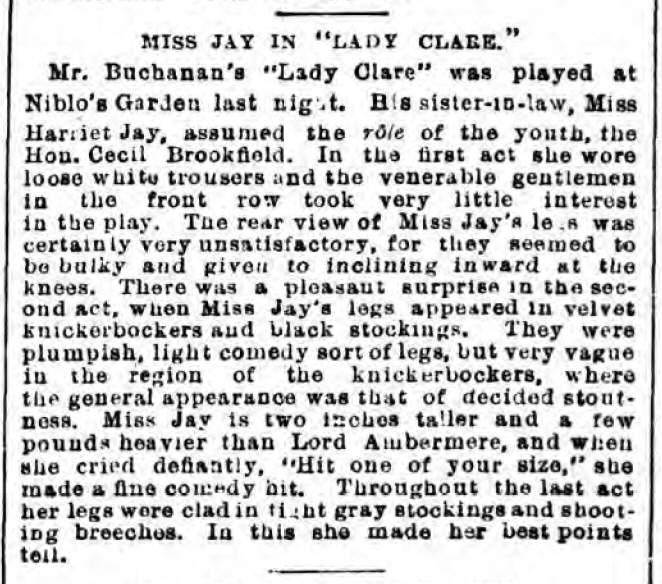 |
|
This review prompted an angry reply from Harriett Jay (or perhaps, Robert Buchanan).
The World (New York) (12 January, 1885 - p.5) MISS HARRIETT JAY RISES. An English Actress and Her Opinion of To the Editor of The World: In the New York Herald of Tuesday last appeared a notice of my performance of the Hon. Cecil Brookfield in “Lady Clare,” written in a strain with which the readers of that newspaper are rapidly becoming familiar and revealing a kind of humor which, I hope for the honor of humanity, is not widely appreciated in America. The writer is a curious sample of a new system of journalism, and he deserves in that character an attention to which his personal insignificance gives him no pretense or claim. ___
Lady Clare was performed again on Wednesday, 7th January, 1885 at a ‘professional matinee’.
The World (New York) (8 January, 1885) The common impression that Mr. Robert Buchanan or Miss Harriet Jay or both of them were responsible for the professional matinee given at Niblo’s Garden yesterday is erroneous. Miss Jay plays only a minor part in “Lady Clare” and has common sense enough to know that very little importance attaches to her performance. Mr. Buchanan probably has a higher opinion of Miss Jay’s abilities and accomplishments than any one else in America, but even he would hesitate to make his sister-in-law ridiculous by claiming for her present work enough prominence to warrant a general invitation to the profession to witness that work. _____
Alone In London
Or perhaps this section should begin with ‘Alone in New York’. One failed play which had only managed a fortnight’s run, and three performances by Harriett Jay, the last two of which generated more publicity about her legs than her acting ability, Buchanan’s attempt to take America by storm was not going well. In a ‘letter’ to the New-York Daily Tribune (21/12/84), Buchanan gave some of his opinions about the theatre in Britain and America under the title, ‘The Stage of To-day’ (later republished in A Look Round Literature). Touching on his own position he wrote: “Having an intimate and practical knowledge of stage requirements, acquired through early connection with the theatre, I find it possible to produce pieces which please the manager, and sometimes the public; but whenever I have proposed any drama lofty in method or unconventional in form, I have been met with the answer that such productions are inexpedient. Management is too precarious a business for experiments of any kind.” Certainly the next two plays which Buchanan tried to produce in America followed the pattern - one was a straightforward melodrama, the other a comedy, and, despite ‘her’ protests in the New York World, both would feature Harriett Jay wearing trousers. The first to be announced was Fascination, although Lady Madge Slashton and her alter ego would not appear on stage until two years later.
The New York Times (11 January, 1885) Mr. Robert Buchanan has just finished a new piece which he calls “Fascination, or, The Way We Live Now.” The piece is in the line of comedy, and negotiations are in progress for its production in New-York during the present season. Mr. Buchanan on Wednesday sent a pleasant letter to Miss Cora Tanner, the handsome young actress who played Lady Clare during the week at Niblo’s, thanking her for the care and skill she bestowed upon the work. Miss Tanner had not been previously seen in New-York for some time. Elsewhere she has a fine reputation for the accomplishment of earnest and effective work upon the stage. ___
The other play, with a major role for Harriett Jay as the waif and stray, Tom Chickweed, was Alone In London, which despite the opinion of The New York Times turned out to be Buchanan’s greatest theatrical success during his lifetime (although, as ever, he failed to capitalise on the profits).
The New York Times (12 March, 1885) Mr. Robert Buchanan has succeeded in disposing of one more play in this country. This piece is called “Alone in London,” and it is to be tried on in Philadelphia some time in May next. If “Alone in London” proves successful it will be brought out in New-York at the beginning of the following season, and after that it will be sent through the general country. “Alone in London” has a material attachment in the shape of Miss Harriet Jay, who appears to be generously thrown in with the most of Mr. Buchanan’s theatrical bargains. Miss Jay is regarded by Mr. Buchanan as the most beautiful woman and the most accomplished actress in the world, and this fact indicates the degree of generosity which induces him to insist that managers who accept his plays shall also receive the further boon of having them performed by the radiant and accomplished Miss Jay. |
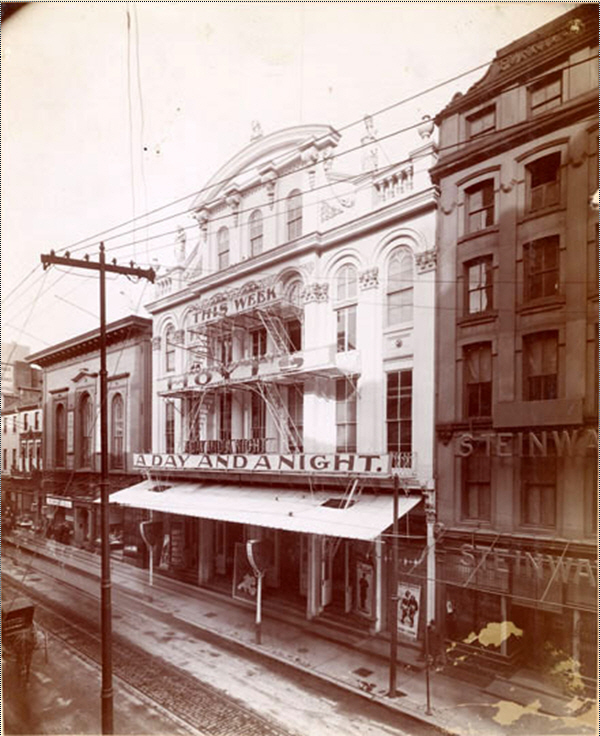 |
|
[Chestnut Street Theatre, Philadelphia.]
Alone in London was first produced at the Chestnut Street Theatre, Philadelphia, on March 30th, 1885. How, or when, the play came to be written is not known. The play’s production seems to have been overseen by Buchanan but the only indication I’ve come across of who financed that original production is contained in the following obituary of Buchanan.
The Atlanta Constitution (Georgia) (4, August 1901) Robert Buchanan, who died in London the day after Sir Walter Besant’s passing but who had been bed-ridden for some time was a born fighter and always involved in a struggle with some one. He made money and lost it, enjoyed himself in his own way and died in poverty and almost forgotten save by a few faithful friends. Buchanan inherited his socialistic notions from his father as also his ideas of a future earthly paradise. Born in 1841 he graduated from the University of Glasgow, and journeyed to London with David Gray, arriving penniless, their sole asset a poem by Gray which no one would buy. They struggled hard for food and lived in an attic room whose furniture was so meager that they used the floor as a desk lying at full length when writing. His great talent was not long unrecognized for “Undertones,” a study of the poor and erring of the great city was a financial success. From 1862 to 1872 he produced many books of poems and novels, the more popular being “God and the Man,” “The Shadow of the Sword” and “Napoleon Fallen,” a lyric drama. Then he took to writing plays and in 1884 came to New York to sell “Alone in London.” General Lloyd Bryce was invited to hear it read. He found the author in an attic room off the Bowery, unkempt, collarless, vestless and looking like a typical anarchist as he is painted by the press. Bryce heard the play read and invested $3,000 in its production. Buchanan selected the caste and the play ran for several years, clearing over $100,000 for its proprietors and author. ___
According to the wikipedia entry for General Lloyd Bryce there was a connection between Bryce and Allen Thorndike Rice, the editor of The North American Review. Rice left the magazine to Bryce in his will, and Bryce was the owner and editor of the magazine from 1889 to 1896. Buchanan developed a close connection to the magazine during his time in America, his essay, Free Thought In America was published in the April, 1885 edition, and his poem, The New Buddha (which Buchanan had offered to The Atlantic Monthly for $100 in September, 1884, according to a surviving letter to Messrs. Fields and Osgood) was published in the May edition. There is also a letter to Andrew Chatto of 3rd February, 1885, in which Buchanan refers to Thorndike Rice as his friend, and tries to interest his publisher in a deal with The North American Review. Added to which there is Harriett Jay’s mention of Buchanan being offered the editorship of the magazine. All of which might add some credibility to the story of Bryce financing the first production of Alone in London. Buchanan’s version of events is preserved in the programme for the London production of the play:
The Olympic Programme and Looker-On (7 November, 1885) “ALONE IN LONDON,” IN AMERICA. ALONE IN LONDON was produced by the authors for the first time on any stage at the Chestnut Street Theatre, Philadelphia, on Monday evening, March 30, 1885, being performed simultaneously in England for the purpose of preserving copyright. Its success in America was so unmistakeable and instantaneous that within a few days it was secured by the well-known entrepreneur, Colonel William E. Sinn, of Brooklyn, for a two years’ tour of the United States and Canada. The entire Company, a remarkably strong one, was re-engaged for that purpose, with the single exception of Miss Harriett Jay, who had created the part of Tom Chickweed for that occasion only, and who shortly afterwards left to produce the play in England. After the summer recess Colonel Sinn’s Company opened, August 31st, at the Park Theatre, Boston, playing for two weeks to receipts of over fourteen thousand dollars; thence to the People’s Theatre, New York, with a week’s business of seven thousand dollars; thence to Brooklyn and Williamsburg, with similar results; thence to the Grand Opera House, New York, with a weekly total of eight thousand dollars. The play is now running every week to phenomenal business. Its popular success is peculiarly interesting, as it destroys the managerial fallacy that a drama, to secure success in America and the colonies, must first have secured a long London run, or possess a London reputation. ___
The Olympic programme then goes on to list several glowing (naturally) reviews from the American press, most of which refer to the subsequent productions by Col. Sinn’s company. One review of the first night, admittedly from a New York paper, is omitted:
The New York Clipper (4 April, 1885 - p.38) PENNSYLVANIA. Philadelphia.—At the Chestnut-street Theatre Robert Buchanan’s drama “Alone in London” was given March 30 for the first time on any stage. It is the story of a simple country girl fascinated by a member of the London “swell mob,” who takes her to the city, where she is alone among thieves. Her husband, Richard Redcliffe is the most villainous villain put on the stage in modern melodrama. His cruelties to his wife, Annie Meadows, his attempt to murder her, her despairing efforts to reclaim him, and his final crime of burglary form the successive climaxes of the prologue and the four acts. The curtain fell on 30 at 11.35 o’clock, which indicates the necessity of pruning away a great deal of talk. The climax of the third act—the attempted drowning of Annie Meadows—fell flat, and was poorly set. The climax of the last act—the detection of her husband in the act of robbing her benefactors—was also feeble. Earlier scenes had already shown more dramatic power. The house was crowded, and the author sat in a proscenium-box. He was not called for. Interest flagged at critical moments all through. It was possible to anticipate the most effective coups. Walter Reynolds as John Biddlecomb, and Charles Coote as Jenkinson carried off the honors. I give the complete cast, merely adding that Harriett Jay made her Philadelphia debut, and was engaged with the play because she was the author’s sister-in-law. ... ___
Alone in London is dealt with in its own section of the site, so there’s no need to go into further detail here. Whatever the merits of the Philadelphia production, Buchanan had managed to interest one American theatre manager in the play:
The New York Times (19 April, 1885) Col. William E. Sinn, of the Brooklyn Park Theatre, will launch out next season as the manager of a heavy traveling combination, in addition to continuing to conduct the establishment with which he has been long connected. To this end Col. Sinn has purchased the American rights in Mr. Robert Buchanan’s melodrama called “Alone in London.” The play was produced a few weeks ago in Philadelphia, and it made enough of a success to warrant Col. Sinn in expending a large amount of money in getting it up to take through the country. He will start out early in September with a strong company and a carload of new scenery, possibly securing a run for his play in New-York in the interval. The company will be headed by Miss Cora Tanner, a young lady of many graces, who long ago established herself as a painstaking and effective actress. Col. Sinn speaks of his new enterprise with enthusiasm, and believes he has secured a play which will prove fully as popular as the “Silver King” or the “Lights o’ London.” |
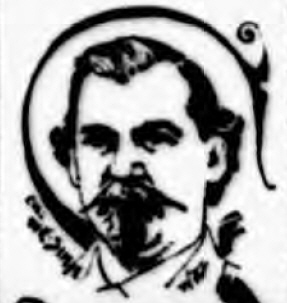 |
|
[The only picture I’ve been able to find of Colonel W. E. Sinn, taken from an article about a charity performance of Fascination in The World (New York) (5 October, 1888). |
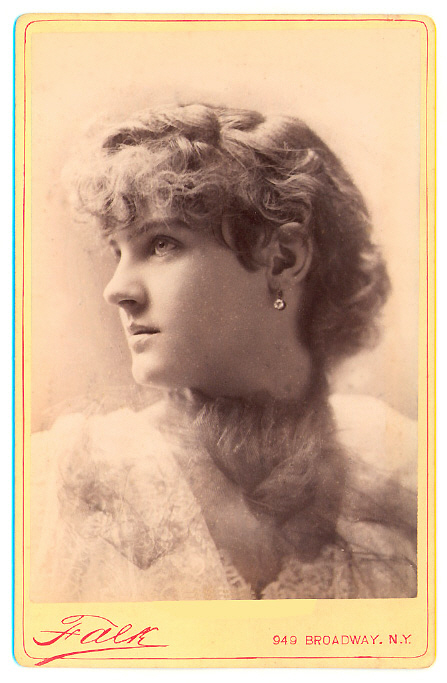 |
|
The next production of the play was at the Brooklyn Park Theatre for one week, commencing May 18th, with the Philadelphia company, minus Harriett Jay, whose part of Tom Chickweed was played by Belle Archer. On 31st August, 1885, Col. Sinn opened his new season at the Park Theatre with Alone in London and the play then toured the country for the next two years with Cora Tanner starring as the much-abused heroine, Annie Meadows. Although Buchanan’s subsequent failure to capitalise on the popular success of Alone in London in Britain is known, according to the following item he did manage to make some money from the American production (which he then presumably sank in the Olympic production):
The Era (8 August, 1885) MISS HARRIETT JAY has returned from America, bringing with her the manuscript of Mr Buchanan’s new melodrama, Alone in London, which was written at her suggestion, and has obtained success in the United States. The American rights have been secured by the well-known entrepreneur, Colonel Sinn, of Brooklyn, who pays Miss Jay forty per cent. of the nett profits, with a guarantee that her share for the first season of forty weeks shall not be less than twelve thousand dollars (£2,400). Mr Buchanan remains very ill, having not yet recovered from the serious pulmonary attack which prostrated him during the severe winter in New York. During the coming season he will produce a new romantic play at Wallack’s and an original comedy at Daly’s. ___
The same edition of The Era carried the following announcement: |
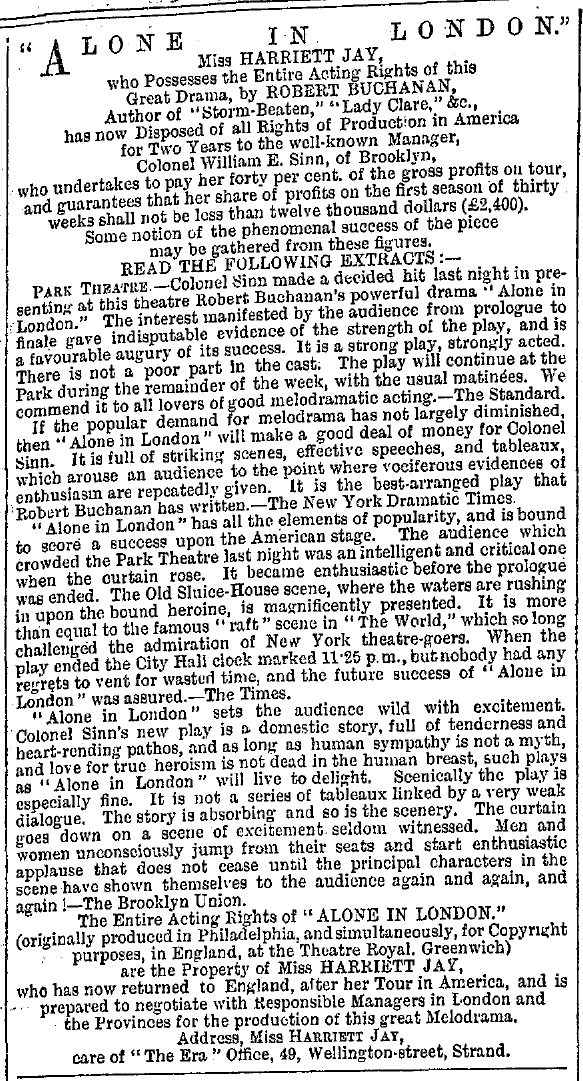 |
|
Alone in London gave Buchanan the opportunity to return to London and quite legitimately claim that his American trip had been, if not a triumph, then at least a success. However, he did not quit America as soon as Col. Sinn signed the contract, there was one more play to sell. _____
Fascination
Prior to the Philadelphia premiere of Alone in London the following item appeared in the American press:
The Evening Critic (Washington, D.C.) (23 March, 1885 - p.2) Mr. Robert Buchanan says: “My new play, ‘Alone in London,’ will be produced in London and Philadelphia on the same day, March 30. I don’t know how American authors feel, but I look with no little envy on the enormous field of life and character lying open before them in this country. In England it is very difficult to hit on anything new. In a talk I had some time ago with Mr. Palmer, that gentleman said that it would amply repay any English dramatist to reside for a time in America and study the vast social material which native dramatists, for some inscrutable reason, persistently neglect; and I have been acting to some extent on his advice. Since I came to America I have been overwhelmed with offers for dramatic work, most of which I have had to decline on account of the pressure of my more important literary avocations. Mr. Daly has made me a liberal offer for the production of an original comedy next season at his theatre, and as soon as I can find time I shall complete a new play for Mr. Wallack.” ___
The plays for Daly and Wallack were also mentioned in that item in The Era after Buchanan’s return to England, but neither materialised. However, the following letter to Augustin Daly has survived: Gedney House, Dear Mr Daly, I have asked Mr Robert Coote to call upon you this evening to ask you if you could help me in any way, by introduction or otherwise, to effect an arrangement by which I could take a new comedy of mine, Fascination, to the Standard. I want to supply Miss Harriett Jay & Mr Charles Coote, with or without complete company, on sharing terms or royalty. I believe they want something good at the Standard, & in this particular piece I have the most absolute faith. Yours most truly Augustin Daly Esq. ___
Robert Coote was the son of the actor, Charles Coote, who played Jenkinson in the Philadelphia production of Alone in London and would reprise the role at the Brooklyn Park Theatre in May. The Standard Theatre (at 102 W. 33rd St.) had burnt down in 1883, was rebuilt, and had reopened on 23rd December, 1884. Daly, of course, had his own theatre, so one does wonder whether this letter was also an attempt to interest him in Fascination. What the letter does reveal is that in April of 1885 Buchanan was still attempting to get Harriett Jay a starring role on the American stage. However, it was not to be. Buchanan eventually sold the American rights to Col. Sinn, and the first actress to don the trousers of Charles Marlowe, was Cora Tanner at the Brooklyn Park Theatre on 30th May, 1887 for a one week trial run. From September of that year she went on to tour America with the play for the next two years to great acclaim. Harriett Jay, after a matinee performance of Fascination at London’s Novelty Theatre on 6th October, 1887, then went on to play the dual role at the Vaudeville Theatre from 19th January to 29th February, 1888. She received the best notices of her career but it was the last time that she appeared onstage in trousers.
|
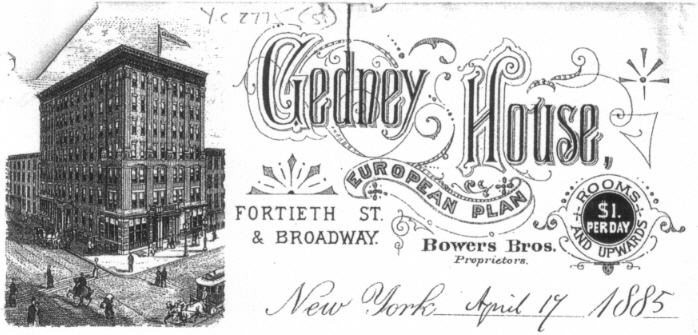 |
|
[Gedney House, the last known address in New York of Robert Buchanan and Harriett Jay.]
Buchanan’s Other Works
Although the main aim of Buchanan’s American visit was to cement his reputation as a playwright (and Harriett Jay’s reputation as an actress) his other literary output during this period should be mentioned. |
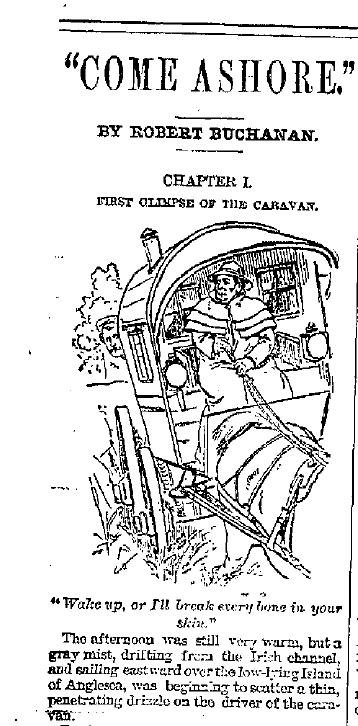 |
|
[The opening of Come Ashore in the Iowa State Reporter (30 April, 1885).]
On April 26th, 1885 the Boston Herald published ‘The Voyage of Magellan’ by Buchanan, a poem which was to form part of The Earthquake, a book which Buchanan had been working on throughout the previous year. |
 |
|
[From The World (New York) (20 January, 1884 - p.1).] On the same day the New-York Daily Tribune published a heavily edited version of the poem. The full version is available on this site and the extract published in the New-York Daily Tribune can be read if you click the picture below. |
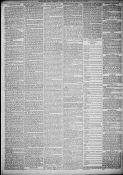 |
|
The poem prompted this response in Boston:
The Boston Daily Globe (29 April, 1885 - p.4) Robert Buchanan’s Poem. To the Editor of The Globe: ___
As mentioned earlier, Buchanan also had two substantial pieces published in The North American Review, the essay, ‘Free Thought in America’, in the April 1885 edition and the poem, ‘The New Buddha’, the following month. I have come across one response to the essay, in the Broome Republican, which perhaps casts some light on the way in which Buchanan and Jay were perceived during their American visit. Since it mentions an invitation to address an “exclusive society”, I have also included two cuttings relating to the Nineteenth Century Club as a possible candidate.
The Daily Graphic (New York) (12 December, 1884) The managers of the Nineteenth Century Club have decided—unluckily for the outside public—not to admit reporters at the meetings hereafter. It has been the custom of various newspapers to report important lectures delivered before this club. Last week, however, no newspaper made any reference to Mr. Higginson’s lecture, “The Aristocracy of the Dollar,” although Mr. Higginson’s sayings and doings have a good deal of force with editors. On the 23d Mr. Robert Buchanan will speak before the Nineteenth Century Club. ___
The Sun (New York) (24 December, 1884 - p.1) DEPEW REPLIES TO HAWTHORNE. The Novelist’s Advanced Views About Society Met by Conservative Theories. The Nineteenth Century Club met last night at the house of Courtlandt Palmer, 117 East Twenty-first street, and Julian Hawthorne read the paper on “Society,” which he read recently before the Long Island Historical Society. Mr. Hawthorne said society was something that could not be defined. Most of the paper was occupied with his ideas of what the ideal society was, and in illustrating many of its peculiarities. He has great faith in American society. We are, he thinks, the corner stone of the future, not the culmination of the past. He closed by noting those peculiarities which distinguish American from English society. The rascals, the defaulters, the robbers, and the like English custom consigned to the rank of the slum dwellers. In America we have, he said, a much better way to treat them, and make something out of them. We send them to Washington. ___
Broome Republican (Binghamton, N.Y.) (2 April, 1885 - p.2) NEW YORK GOSSIP. A Caustic Criticism on Mr. Buchanan’s Methods— ... Correspondence of the REPUBLICAN. Mr. Robert Buchanan’s article in the “North American Review,” which discusses the American character and all that pertains to Americans, with excessive severity, has excited a good deal of comment here during the last few days. This is not at all surprising, not because Mr. Buchanan’s opinions have much weight, but simply because the “North American Review”—a most important periodical—has presented Mr. Buchanan’s opinions to the country. When Mr. Buchanan—a Scotch poet, novelist, and dramatist, who had made himself conspicuous in England as the defeated defendant in a suit with Algernon Charles Swinburne—came to New York last Summer, he was inclined to think very well of us. He had several plays in his pocket, and, naturally, he wanted to get rid of them. One of his plays, “Storm Beaten,” had been produced at the Union Square Theatre before his arrival, and it won fair success there—though “Storm Beaten” is not a good play. “Constance,” another of his plays, was produced at Wallack’s, where it failed spontaneously. Mr. Buchanan is also the author of a comedy, which was given a few days ago in London, and which was condemned outright. As an author of dramatic failures, Mr. Buchanan may be described enthusiastically. I am convinced that Mr. Buchanan came here with the conviction rooted in his mind that he was a good deal better than we are, and that he had much to teach us. At any rate, he took an apartment in the town, worked industriously, and tried hard to make himself acceptable to us. He had only one companion, his sister-in-law, who is an actress and an author. Many New Yorkers were not disposed to admire Mr. Buchanan’s freedom in travelling and living with his sister-in- law, who may be an excellent woman, though she is certainly not an excellent actress. Here is a little anecdote, for instance, with a moral. Mr. Buchanan was invited, during the Winter, to speak on a literary subject before an exclusive society—most of the members and guests of which are charming gentlemen. Mr. Buchanan accepted the invitation. But the members were informed unexpectedly, that Mr. Buchanan and his sister-in-law took slight notice of social usages. They requested Mr. Buchanan, in consequence, not to appear before their society. He was obliged to assent to their request—or demand—though he protested against it angrily. It is possible that the indignation which was aroused in him by this unpleasant occurrence helped to sour his mind. But that was only one among many of their disagreeable occurrences. Mr. Buchanan was not received with fervor by the artistic and literary class of New York. He was regarded by his class as a bumptious and pretentious Britisher. Years ago Mr. Buchanan wrote some very silly and insulting things about American authors. If he was not received here with open arms, therefore, the fault was his, not that of the authors. On the whole Mr. Buchanan has been unsuccessful in our city with his plays, and unpopular with our people. Mr. Buchanan may not know why he is unsuccessful, he knows why he is unpopular. That is a galling fact, a fact, too, which may have induced him to denounce, in the North American Review, American literature, American art, and American public men. Imagine this absurd person declaring pompously that we have no literature to speak of, that we are corrupt, uncultured, and, possibly, half-civilized; this person who has been laughed at and ignored since he came to our city. What a ridiculous contrast he makes with Mr. Edmund Gosse and Matthew Arnold.
Buchanan’s Theatrical Ventures In America - continued
|
|
|
|
|
|
|